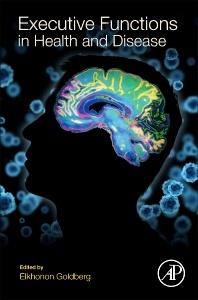Description
Executive Functions in Health and Disease
Coordinator: Goldberg Elkhonon
Language: English
Subject for Executive Functions in Health and Disease:
Keywords
Addiction; Aging; Alzheimer's disease; Assessment; Attention; Attention-deficit hyperactivity disorder (ADHD); Autism spectrum disorder; Autonomic response; Basal ganglia; Behavioral inflexibility; Brain activity; Brain lesions; Cannabis; Ceiling effects; Chronic stress; Cocaine; Cognition; Cognitive control; Cognitive control network; Cognitive impairments; Conscious perception; Consciousness; Context-dependent reasoning; Cortical circuitry; DECHA; Daily functioning; Decision making; Decision-making; Demographically corrected norms; Development; Developmental disorder; Diabetes; Diagnosis; Dopamine; Early-onset Alzheimer's disease; Ecological validity; Emerging behavior; Emotion; Endocrine disease; Executive cognition; Executive control; Executive function; Executive functioning; Executive functions deficits; Executive functions recovery; Exploratory behavior; FMRI; Flexibility; Floor effects; Frontal cortex; Frontal lobe; Frontal lobe epilepsy; Frontal-subcortical networks; Frontotemporal dementia; Functional connectivity; Functional lapses; Functional magnetic resonance imaging (fMRI); Genetics; Global workspace theory; HIV; Habits; Higher order theories; Human brain transcriptome; Huntington's disease; Hypertension; Inhibition; Inhibitory control; Kidney disease; Liver disease; Lower order processes; Major depressive disorder; Meditation; Mental representation; Metaanalysis; Methamphetamine; MicroRNAs; Music; Myelination; Neural networks; Neurodegeneration; Neuroplasticity; Neuropsychiatric illness; Neuropsychological testing; Neuropsychology; No-report paradigm; Nocturnal frontal lobe epilepsy; Nonneurogenic seizures; Norepinephrine; Norms; Obsessive compulsive disorder; Oligonucleotide microarray; Opioids; Panic attacks; Parasomnias; Parkinson's disease; Perception-action cycle; Planning; Plasticity; Population-based norms; Postnatal development
612 p. · 15x22.8 cm · Hardback
Description
/li>Contents
/li>Biography
/li>Comment
/li>
Executive Functions in Health and Disease provides a comprehensive review of both healthy and disordered executive function. It discusses what executive functions are, what parts of the brain are involved, what happens when they go awry in cases of dementia, ADHD, psychiatric disorders, traumatic injury, developmental disorders, cutting edge methods for studying executive functions and therapies for treating executive function disorders. It will appeal to neuropsychologists, clinical psychologists, neuroscientists and researchers in cognitive psychology.
EXECUTIVE FUNCTIONS IN HEALTH 1. Prefrontal Executive Functions Predict and Preadapt 2. The Cellular Mechanisms of Executive Functions and working memory: Relevance to Mental Disorders 3. Gene expression in the Frontal Lobe 4. A Functional Network Perspective on the Role of the Frontal Lobes in Executive Cognition 5. Neural Network Models of Human Executive Function and Decision Making 6. Crucial Role of the Prefrontal Cortex in Conscious Perception 7. Neurodevelopment of Executive Functions 8. Executive Functions and Neurocognitive Aging 9. Assessment of Executive Functions in Research
EXECUTIVE FUNCTIONS IN DISEASE 10. Cognitive, Emotional and Behavioral Inflexibility and Perseveration in Neuropsychiatric Disease 11. Functional Neuroimaging of Deficits in Cognitive Control 12. Executive function in striatal disorders 13. Neurodevelopmental disorders and the frontal lobes 14. Executive control and emerging behavior in youth with Tourette’s Syndrome 15. Inside the Triple-Decker: Tourette’s Syndrome and Cerebral Hemispheres 16. Executive Dysfunction in Addiction 17. Seizures of the Frontal Lobes: Clinical Presentations and Diagnostic Considerations 18. Executive Functions after Traumatic Brain Injury: From Deficit to Recovery 19. Dementias and the Frontal Lobes 20. Executive Function in Posttraumatic Stress Disorder 21. Executive Dysfunction in Medical Conditions 22. Assessment of Executive Functions in Clinical Settings
- Encompasses healthy executive functioning as well as dysfunction
- Identifies prefrontal cortex and other brain areas associated with executive functions
- Reviews methods and tools used in executive function research
- Explores executive dysfunction in dementia, ADHD, PTSD, TBI, developmental and psychiatric disorders
- Discusses executive function research expansion in social and affective neuroscience, neuroeconomics, aging and criminology
- Includes color neuroimages showing executive function brain activity




